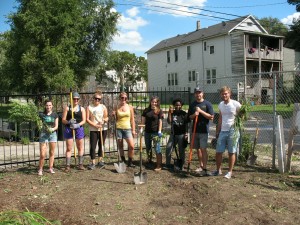
This coming fall semester (2015) I will be offering a transformational service learning course, SUST 350 Service and Sustainability, at the Chicago Campus. Our course theme is Urban Farming, Environmental Education, Community Development, & Social Justice.
- Title/number: SUST 350 Service and Sustainability (section 01)
- Semester offered: Fall 2015
- Location: Chicago Campus / Eden Place Nature Center
- Day/time: Tues 12-3pm
- Pre-req: UWR
SUST majors and minors may take this class to fulfill an upper-level SUST requirement, but 350 also is open to students at large who need a general education course or desire elective credit.
Introduction to the Course
SUST 350 focuses on one of sustainability’s “Three Es” — social Equity — within the broad context of Environmental stewardship and Economic development. Students will learn about one of the most important components of sustainability — food production and consumption — in the context of urban neighborhoods and ecosystems.
By doing hands-in-the-dirt labor at Eden Place Nature Center on the city’s South Side neighborhood of Fuller Park, students will gain direct knowledge of contemporary organic/urban agricultural systems as well as learn about pressing urban social justice issues such as food deserts, gentrification, pollution, environmental racism, and persistent poverty. The initial class meeting will be at RU’s Chicago Campus, and subsequent class meetings will take place at Eden Place Nature Center.
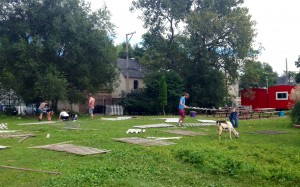
An urban farm is about food, but so much more besides. The Fuller Park community is an economically stressed neighborhood that is bisected by the Dan Ryan expressway and bounded by railroads on its eastern and western borders. Here, an urban farm and community nature center is a source of freshly grown, organic produce; a training ground for local youth in need of practical job skills; a stop valve in the Cradle-to-Prison pipeline; a gathering place for people of all ages in the community for physical exercise, informal education, and social events; a demonstration site for sustainable agricultural and ecological restoration techniques; a model of economic development on a local, sustainable scale; and a means of reconnecting urban folk to the natural world. More generally, in urban areas starved for jobs, green space, safe outdoor gathering places, and fresh quality food, enterprises like Eden Place productively and powerfully address the need for social equity and progressive change.
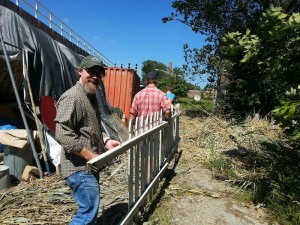
Our main focus will be on helping with various urban agriculture and environmental restoration projects at Eden Place Nature Center at 4417 S. Stewart, as well as at the Eden Place Farm at 4911 S. Shields. Our typical day will consist of meeting at the WB Lobby ~11:30am to take the Red Line to EPNC (students have the option of commuting there directly to meet at noon); convening at 12pm for discussion of assigned readings and, later in the semester, informal student presentations; and then working with Eden Place staff on various environmental, farm, and/or public education projects according to the needs and schedule of Eden Place.
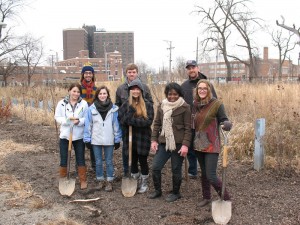
The vast majority of our work takes place outside, regardless of weather. We built trails, planted trees, pulled weeks, raked leaves, managed compost piles, helped set up activities and structures for Octoberfest, repaired and installed fences, and many other chores/activities. We also interacted with EPNC staff to learn about their mission and vision for the future. Last but not least, we always had a little time each week to visit with EPNC’s many animals, including Gaga the goat (who loved to intervene during our roundtable discussions in the gazebo!).
Partner Organization: Eden Place Nature Center
From the Eden Place website:
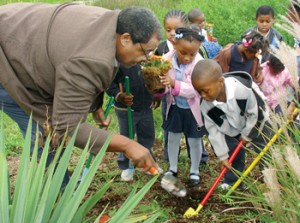
“In 1997, community member, founder, and Executive Director of Fuller Park Community Development Michael Howard [pictured at left] was concerned about the serious lead poisoning problems affecting the neighborhood children. Through research he discovered that Fuller Park contained the highest lead levels in the city of Chicago. As a community leader he wanted to make some serious changes for the sake of his family and his entire neighborhood, and he decided that this work would start with the illegal dumpsite located across the street from his home.
“Mounds of waste over two stories tall encompassed the entire three acres of land. Mr. Howard acquired the deed for the land and involved the community in a large scale, three year clean-up of the dumpsite. Alongside his wife and fellow activist Amelia, and in partnership with hundreds of volunteers and community members, Mr. Howard led a clean-up project in which more than 200 tons of waste including concrete, wood, tires and other toxin-laced materials were removed from the site.
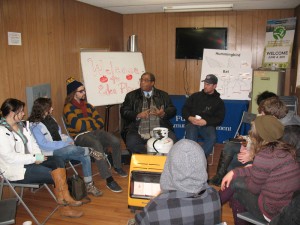
“Upon clean-up of the site, the next step was development. Tons of fresh soil were brought in to establish the Great Lawn, and the Hope Mound was established as the first permanent fixture on Eden Place. South Point Academy trainees contributed a number of early structures to the Eden Place grounds, including the gazebo, DuSable Trading Post, and the storage sheds. The Mighty Oak and other surrounding trees formed the woodland at the north end of the property, including a reflecting pond meant to encourage reflection and respite from the urban surroundings.
“In May of 2004, Eden Place was honored by the U.S. Environmental Protection Agency and Chicago Wilderness with The Conservation and Native Landscaping Award. The winners were recognized for their extensive and creative use of natural landscaping to support native plants and animals that contribute to the region’s biodiversity. That same month, Eden Place was filmed for a PBS special documentary called Edens Lost & Found. This documentary profiles activists and organizations in Los Angeles, Seattle, Philadelphia, and Chicago who are attempting to ‘improve the quality of life and public health by encouraging community and civic engagement through the restoration of their urban ecosystems.’
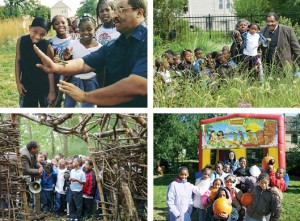
“Eden Place has continued to develop and grow with the support and recognition of local leaders and organizations. We have worked to raise awareness amongst community members about the environmental problems that have affected their families for years. Local residents are making connections with nature like never before, and they are feeling a sense of community pride like never before. However, our work in the community is not finished. More than 3/5 of the local area is comprised of abandoned lots where homes and various industries once thrived, and Fuller Park residents still carry the burden of one of the highest local lead contents in the city. Through our partnership with local and national conservation organizations such as the Chicago Zoological Society, the Audubon Society, the U.S. Forest Service International Programs, Chicago Wilderness, Openlands, and NeighborSpace, we will continue to establish green community space and education that will improve the health and well-being of our community.”
For more information on this unique service learning course, please contact Prof. Mike Bryson (mbryson@roosevelt.edu or 312-281-3148).